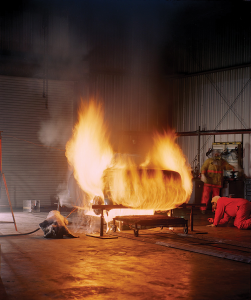Fire Safety: What Can You Do?

A flammability test determines how fast a substance burns. These scientists are observing how a car’s plastic fuel tank holds up during a fire.
© Southwest Research Institute
After the tragic fires in Philadelphia, Pennsylvania, and the Bronx in New York City took the lives of 29 people within a week, it is an important time to review fire safety tips. House fires occur more often in winter due to the use of space heaters, fireplaces, candles, cooking, and other heating equipment. While you huddle up to keep warm, check to make sure you are being safe.
Fire prevention is a term for the many safety measures and programs used to keep harmful fires from starting and to reduce injuries to people and damage to property. Many individuals, groups, and communities work to prevent fires and reduce injuries to people. They use three main methods: (1) laws and regulations, (2) inspection of buildings and other property, and (3) public education about fire safety. Each year, fires cause thousands of deaths throughout the world. Most of the deaths and injuries that are caused by fire occur at home. Some simple precautions can help keep your home—and the people in it—safe from fire.
The leading causes of fires in the home are cooking, heating equipment, arson, electrical equipment, and smoking. Since the 1980’s, both the number of home fires and deaths related to them have been in decline. The decrease is the result of such initiatives as fire prevention programs; regulations requiring furniture to be less easily ignited; and the use of smoke alarms and sprinkler systems.
A smoke alarm is a device used in homes and other locations to warn people of smoke or a fire. You can help ensure your family’s safety in case of fire by installing one or more smoke alarms. The alarm makes a loud noise within seconds after smoke enters its vents. Smoke alarms operate on household electricity, battery power, or both. Typical locations include on the ceiling in and just outside sleeping areas, and on each level of a home. Make sure there is a working smoke alarm in your home and consider installing a residential sprinkler system.
See if your family or building has a fire extinguisher. A fire extinguisher is a metal container filled with water or chemicals used to put out fires. Fire extinguishers are portable and easy to operate and can be used to put out small fires before the flames spread.
To prevent cooking-related fires, do not leave food cooking on the stove unattended. A pan of hot cooking oil can quickly become a blazing grease fire. If a grease fire starts, do not try to move a blazing pan. Instead, put a lid on the pan or use a fire extinguisher to put out the fire. Do not pour water on a grease fire because it will cause the fire to spread.
Another way to prevent fire is to keep matches and flammable materials away from children. Never play with fire. Stay away from fires, especially because many types of fabrics burn easily. Do not stand near heaters, candles, lighted stoves, bonfires, or other sources of high heat. If fabrics or similar materials catch fire, use a fire extinguisher to put out the blaze.
Fires can be caused by faulty electric wiring in houses. In old homes, have a qualified electrician regularly check electric wiring and replace any wires that appear weak or worn. Limiting the use of extension cords can also prevent fires from starting. A fire can also result from overloading one outlet with appliances.
Cleaning out cluttered spaces is also a good idea! Clear out rubbish, old clothing, and other unused items from the attic, basement, closets, and other storage areas. A fire could easily start there.
Gasoline and other flammable liquids, such as paint and furniture polish, should be stored in tightly covered containers. Keep such items away from the stove, fireplace, and other sources of heat. Such materials should be stored in a separate storage area, if possible, or at least in the garage.
If you have a fireplace, put a screen in front of it to prevent sparks from flying out. Remind others that cigarettes and other smoking materials must be put out completely, using ashtrays.
As a family, plan an escape route from each room and hold a home fire drill regularly. All exits must be kept clear at all times. It might seem silly when you are practicing, but it can make a big difference if a fire does occur.
If there is a fire, call the fire department after exiting the house or building. This call should be made from outside the house right away. Plan a meeting at home about fire safety and see what you can do to keep your home and family safe this winter.


